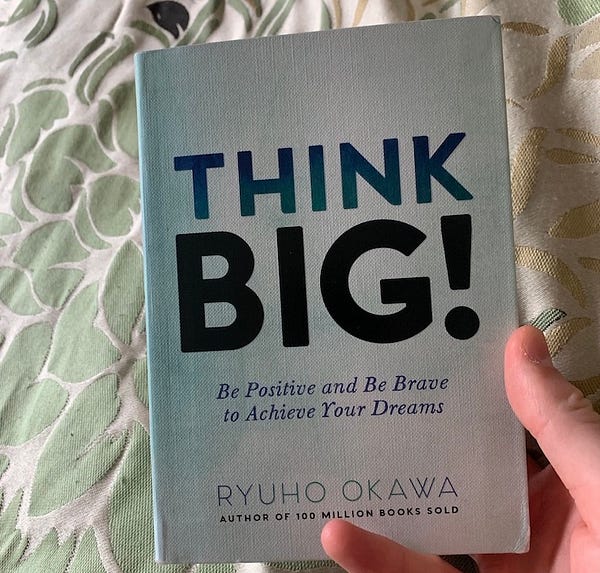Think Big! by Ryuho Okawa

I found this book sitting on my bookshelf and thought it was one I should read. I don’t know where I got it and I don’t know why I haven’t read it before. It was a little shorter than some of the others that I have finished this year and I thought maybe I could finish it on a plane ride — I almost did.
This is something I have taken very seriously. It’s essential to me that I read from people who I respect and admire. We are a product of our environment so that is just one reason that I personally prefer nonfiction, biographies, and faith-based books. Nothing against any of the other genres, I just know what I am aiming for in the future and becoming.
Pg. 22, It is particularly important to stay away from writers who lead destructive lives, because if you read too many of their works, their ideas can influence your way of thinking.
I agree with this entirely. One of my chiropractor friends recently asked on Facebook, “How would you feel if someone stole your idea and improved upon it.” I said I would feel honored.
Pg. 24, They were someone else’s ideas in the beginning, but if you felt a strong interest in them and read them over and over, so much that they have become a part of you, then they have become your own philosophy that you will base your decisions on throughout your life.
I think that this was very interesting to think about and spend time reflecting on. Men and women greatly differ and I believe that is always important to be aware of when we are in situations and people are perceiving things differently and thinking differently.
Pg. 35, In general, the male brain has a propensity for intense, long-term effort.
To be women, their senses have always had to be on high alert; they had to be aware of everything that is happening around them so they can focus on many things at once.

As Tim Grover says, “To be relentless you make decisions NOT suggestions.” I agree. There is no maybe. You can have the greatest idea in the world but without action, it’s all for nothing. I like where he affirmed the correction to a wrong decision. He reminds us, “all you have to do is fix it later.” That’s so true. It is important not to be tied to our decisions and to understand that sometimes we will be wrong, we will need to adjust and change our approach, and we will need to make revisions frequently.
Pg. 39, When I am given work, I look at it and make a decision right away. Even if I make the wrong decision, all I have to do is fix it later. Frequent revisions are an inevitable part of life, so accept that and change your approach; make decisions right on the spot, and revise them later if any of them are wrong. Otherwise, it will be impossible for you to get more things done.
I see this in the people around me. My Dad can be used as an example. When he was fresh out of college, he moved from Milwaukee to California and Arizona. There was an opportunity that he liked and he took advantage. Now, more than 30 years later, he remains the part-owner of a company in Wisconsin but does not take advantage of great opportunities in the same fashion. This is something I look to combat as I age; I know that it’s biological in the past, it was necessary. When we were hunter/gatherers and had less safety, we needed to be less risk-oriented for our protection and safety. But in today’s society? That’s not needed in the same way.
Pg. 48, As we age, however, our courage begins to wane and we start to take a more defensive approach to life. We might hesitate to do something in a new way because we think the old ways have been working well so far and are good enough. Or we might be afraid to make a decision between two people because we are afraid of offending one of them. This is how we slowly get used to overthinking. Instead, we should make a persistent effort to keep things simple and uncomplicated. When we do so, we see our wisdom grow. We discipline ourselves to rationally accept things as they are and avoid complicating things, even as we continue to experience new things and gain new knowledge.

I was like wait wow this is so real. I see this too. I think it’s crazy that we act in this way. We make decisions based on perception. We may have the greatest innovation in science yet not publish it because we are unsure of how it will be received, or even worse, what if it is disproved? It’s silly but it’s relatable and it’s difficult to overcome, at least now you are aware too.
Pg. 55, They work at one of the best schools in Japan. Yet, ironically, those who become professors there tend to publish fewer books because they are afraid that if they publish something wrong, their reputation will suffer.
I loved reflecting on this point. We need to remember that it is important to build up a rapport and a reputation before we attempt to show that a new idea of ours should be accepted and implemented. Company culture is a very delicate thing and I think that a large part of that is balancing two things, the egos or personalities of senior people and their more defensive approach to life as they age. With both things put together, they are likely not the ones coming up with ideas anymore and eventually, new employees will need to be the ones who generate those ideas.
Pg. 68, If you ever find that your opinion is rejected, remember that it could be because immediately accepting an idea from a new employee could invite jealousy from older colleagues who might then harass you. This may be especially likely to happen to you if you have a lot of potential to grow and become successful in the future.
I love this point. The key part here is a debate, not an argument. Debates are polite and respectful and should simply exchange points of view in my mind.
A debate is defined as: a formal discussion on a particular topic in a public meeting or legislative assembly, in which opposing arguments are put forward.
An argument is defined as: an exchange of diverging or opposite views, typically a heated or angry one.
Pg. 107, In a debate, someone without knowledge cannot win against someone with knowledge.
I have noticed this happens to me at times. My mind works quick and I often look to draw my own conclusions. Because of that, I am sometimes wrong and because of a quick judgment or conclusion, I do not get the desired result.
Pg. 110, Intelligent people tend to give up easily, simply because they are too quick to make judgments. It is a shame that they do not use their intelligence to make good judgments, for often they make the wrong premature judgment.
There is always a way. Everything is negotiable. With God, nothing is impossible.
Pg. 131, When we find ourselves in adversity, we should not offer a list of reasons to persuade everyone why our situation is impossible to overcome. Even if a problem seems insurmountable, take a step back. Take a close look, and search for a solution. Search for a way to overcome the problem, and breakthrough it.

I enjoyed this book, I learned from it, and I grew as an individual. Because of that, I give the book a 4/5. I liked learning from the various points and I enjoyed the unique perspective of Ryuho. He accomplished incredible things and it was wonderful to learn about all of the adversity he overcame along the way.
I gave this book a 4/5